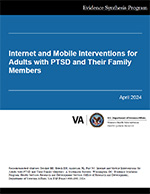
|
Recommended citation: |
Download PDF: Complete Report, Executive Summary, Report, Appendices
Military Veterans and service members may experience small to negligible benefits on PTSD and depressive symptoms from internet and mobile interventions for PTSD. Civilians may experience moderate benefits at post-treatment, but these gains do not appear to be sustained. Consequently, the available evidence does not currently support these interventions as an effective treatment for Veterans with PTSD. Based on a small evidence base, internet and mobile interventions do not appear to benefit family members of adults with PTSD.
Approximately 10% of US Veterans experience PTSD during their lifetime. Despite considerable advancements in care, most Veterans with PTSD still do not access and benefit from PTSD treatments. Self-guided, asynchronous PTSD treatments delivered via the internet or mobile phone have the potential to expand access to treatment. The aim of this review is to synthesize the available evidence on the effectiveness of internet and mobile interventions for individuals with PTSD and family members or caregivers of individuals with PTSD.
Internet and mobile interventions may have small to negligible benefits on PTSD and depression outcomes for military Veterans and service members. Findings are based on mostly RCTs of internet-based cognitive behavioral therapy (iCBT) that varied in comparison condition, treatment duration, and provider involvement. Studies had notable methodological limitations and inconsistent results. Internet and mobile interventions may have small to moderate short-term benefits on PTSD and depressive symptoms for civilian populations, but do not appear to be long lasting. Symptom improvement appeared to be largest for interventions with greater therapist involvement, compared with interventions with minimal or no provider support. It is unclear whether internet and mobile interventions for caregivers and family members of adults with PTSD improve stress, coping, or mental health symptoms. Only 5 studies were identified and effectiveness differed across studies.
Internet and Mobile Interventions for Adults with PTSD and Their Family Members: A Systematic Review (Management Brief)